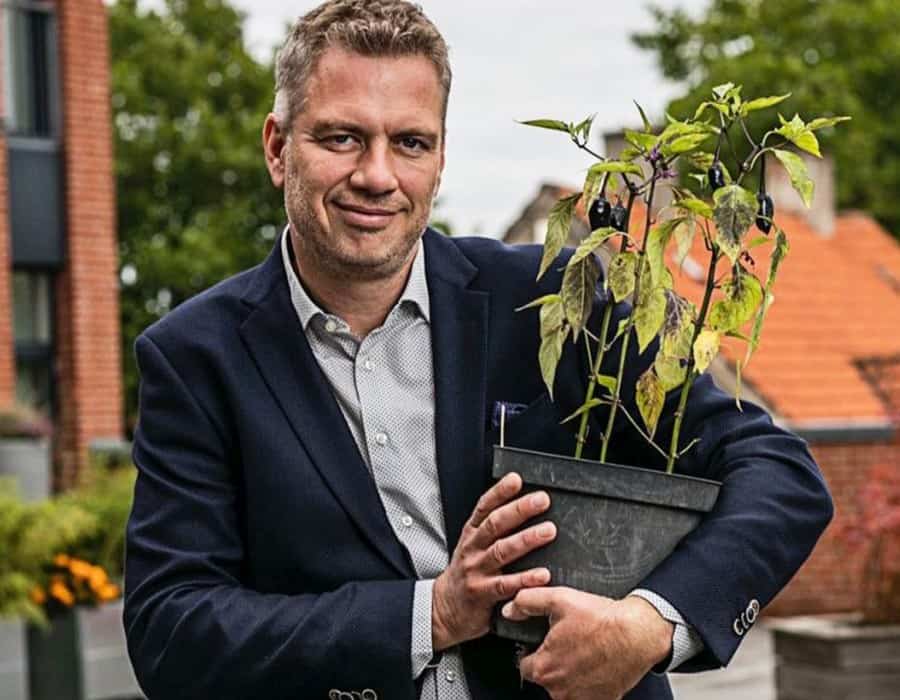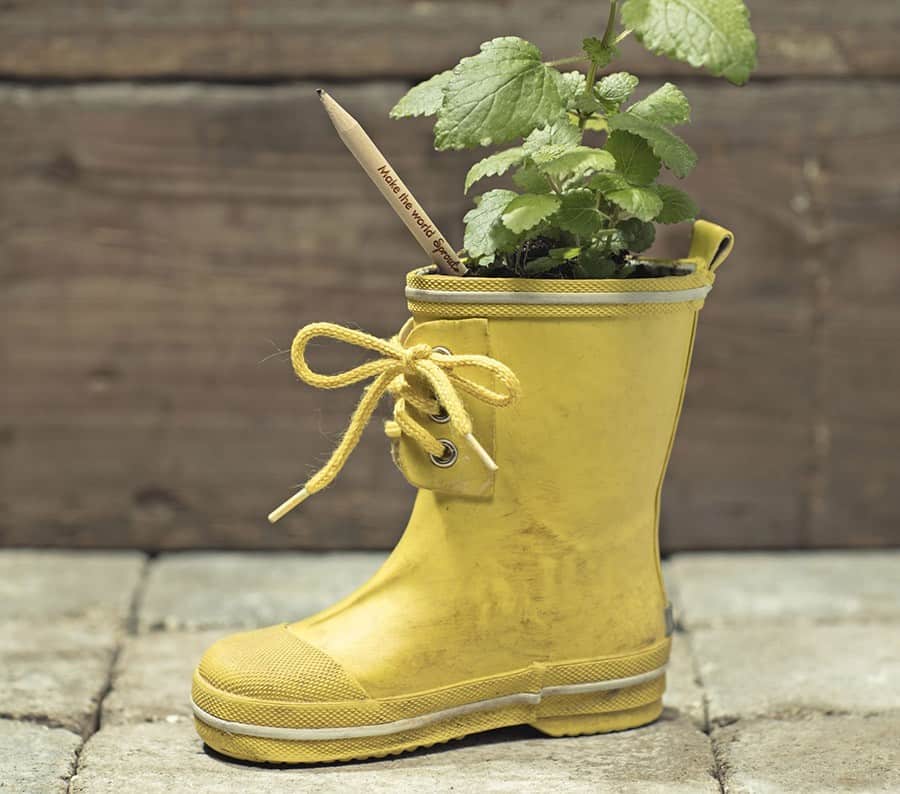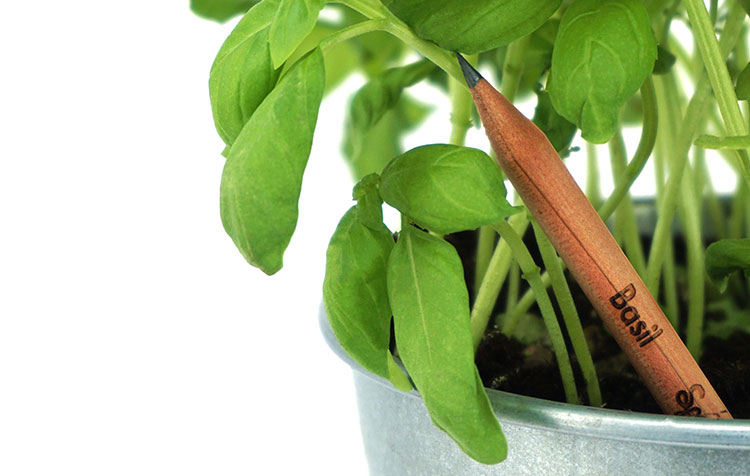In the search for sustainable alternatives for a plastic-free everyday school life I am on the plantable pencils from Sprout. Once the pencil has been applied, the seeds from the end of the pencil can be used to plant new trees. I think the project from Denmark is great and immediately made an appointment with Michael Stausholm, the founder of Sprout, for an environmental protection interview.
What is the idea behind the Sprout pencil?
The idea behind the Sprout pencils is to create a pencil that can have a second life as a plant when it has become too short to paint or write with. Instead of throwing away the leftover stub, you simply plant it in a pot of soil and watch it transform into a flower, herb or vegetable plant with the help of a little light and water. The pen encourages children, adults and even businesses to recycle more and think about how even small steps can contribute to greater sustainability and environmental protection. Sprout customers are mainly companies and organizations that have replaced the unfortunately still so common promotional gift "plastic ballpoint pen" with a Sprout pen. This is because Sprout pens can be individually engraved with logos or slogans and used as a green give-away or simply as a good conversation starter. (Note: regarding the cheap ballpoint pens, we have been working with the Zero Waste principle. Say no and refuse another alternative)
The idea for the pen originally came from a group of students at the Massachusetts Institute of Technology (MIT) in Boston. They had the task of developing a sustainable office product and then came up with this idea, for which they launched a Kickstarter campaign. There I saw the idea and was excited, I bought it without further ado and started the company Sprout in 2013. Today we have the full rights to the idea, the brand and the patent to the pen as well as all other plantable writing instruments.

What is the plantable pencil made of?
The pen is 100 percent natural and biodegradable. All Sprout pens are made from PEFC or FSC certified organic natural wood. This means that for every tree cut down, another is planted. No lead is used in the leads, which are made of graphite or clay. The seed capsule at the end of the pen is made of cellulose, peat and high quality seeds. It dissolves when it comes into contact with soil and water. Currently our pen is available with 14 different seeds, including bearded carnation, basil, daisy, cherry tomato, sunflower or forget-me-not.
Theoretically, 10 million plants can grow from the 10 million pens sold so far. A total of 57 trees were felled for their production, as around 170,000 pens can be made from one tree.
Who is the team behind Sprout?
Behind Sprout is a very passionate team. The company has a main office near Copenhagen, where around 10 people work. Currently, plans are underway to open a second office on the East Coast of the USA. Sprout sells its pens in over 60 countries.
How is the project financed?
Sprout was originally financed by requiring customers to pay for their orders in advance. In this way, no major investments were required at the beginning. In the meantime, however, there have been a few investments. However, the main shareholder of the company is still me as the founder.
Where are the vegetable pencils made and how are they shipped?
Sprout pens are produced both in the EU (Poland) and in the USA (Minnesota). In this way Sprout tries to use as short distances as possible for shipping and to use as little CO2 as possible when selling to 60 countries.

What sign do the plantable pencils make?
Sprout's mission is to inspire people and businesses to make greener choices. If you can plant a pen, what else can you do to make a difference? Even very small steps count! Simply trading in a plastic ballpoint pen for a Sprout pen can mean a difference. Worldwide, 50 billion plastic ballpoint pens are produced and sold each year. That's 135 million plastic pens per day. A huge amount of plastic that sooner or later will just be carelessly thrown away and end up in landfills. If we can replace just a tiny fraction of these pens with plantable pens, we have a good reason to produce them and be happy about making the world a little bit greener.
How will Sprout continue to develop as a company?
There are already a lot of ideas for this. Very recently, for example, we developed the world's first plantable makeup stick. My expectations for this product are high, I want to penetrate the large market of the cosmetics industry and it looks very promising so far.
In addition to the B2B business, we also want to further expand the private customer business. That's why we regularly develop special editions, such as the Spread The Love Edition, for which we have engraved the pencils with symbols and sayings that make them an ideal gift for lovers or friends. We are now launching the Kids Color Kit, which consists of eight different colored pencils and a matching coloring book. It's an easy way to show kids what sustainability means in a playful way - simply a great gift for the next birthday party.
Where to get the pencils that become a plant?
Currently, the plantable pencils can be purchased as private get here. Interested companies that want a larger quantity of branded pens in individually designed packaging simply order directly via the Sprout website.
I am an avid fan of the plastic free and plantable pencils. The concept is convincing and the people behind it work with honest enthusiasm for nature. When Environmental protection in school is only focused on very slowly, projects like Sprout have to bring the topic of sustainability into schools. What do you think about the plantable pencil? I look forward to your comments below this post!
Stay clean,

PS.: In the Plastic free store you can find in the category Baby & Child by the way, more great plastic-free alternatives to traditional plastic items at school.







find the idea super, but peat should not be in there!
Hi Anke! Can you explain the problem with peat? It harms the soil as far as I know, right?
Many greetings,
Christoph
Thank you 🙂
Always a pleasure Sophie! 🙂
Greeting, Christoph
Comments are closed.